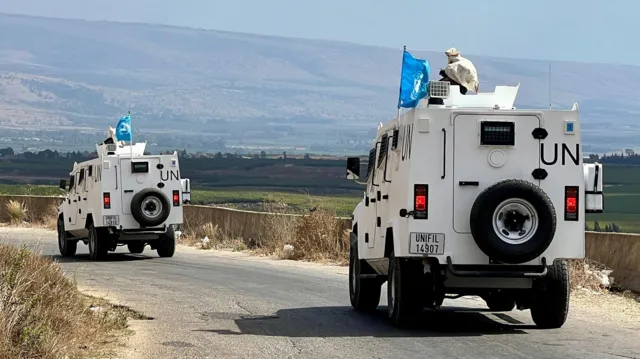Israeli Tanks breach UNIFIL base in Southern Lebanon amid growing tensions
The United Nations peacekeeping force stationed in southern Lebanon, known as the UN Interim Force in Lebanon (UNIFIL), reported that Israeli tanks forcibly entered one of its positions near the border early Sunday morning. According to a statement by UNIFIL, two tanks from the Israel Defense Forces (IDF) destroyed the main gate of a post in Ramyah, a village close to the Israeli border, demanding that the peacekeepers turn off their lights.
Roughly two hours later, rounds were fired near the UNIFIL base, leading to a smoke-filled atmosphere within the camp. This caused 15 peacekeepers to suffer from skin irritations and gastrointestinal reactions, likely due to the fumes. The UN mission expressed concern over the violation, calling it a serious breach of international law.
The IDF presented a different account of the incident, claiming the breach was part of a rescue operation for soldiers who had been injured by an anti-tank missile fired by Hezbollah. According to the IDF, two soldiers were critically wounded in the attack, and the tanks had to reverse toward the UNIFIL position to facilitate their evacuation. The IDF acknowledged that a smoke screen was deployed to assist in the rescue but stressed that it had maintained communication with UNIFIL throughout the operation, ensuring there was “no threat to UNIFIL personnel from IDF activities.”
READ ALSO: Iran slams US sanctions on Its energy sector as ransom to Israel
Reacting to the incident, UN Secretary-General António Guterres issued a stern warning that any attacks on peacekeepers could be classified as war crimes. “UNIFIL personnel and its premises must never be targeted,” Guterres said through a spokesperson, emphasizing that attacks on peacekeepers are a breach of international humanitarian law.
This confrontation is the latest in a series of escalating encounters between Israeli forces and UNIFIL as tensions rise along the Lebanon-Israel border. Israel, which launched a ground incursion into southern Lebanon in late September to target Hezbollah, has repeatedly called on UNIFIL to vacate the region, claiming that their presence puts them in harm’s way. Prime Minister Benjamin Netanyahu reiterated this call on Sunday, stating that UNIFIL troops are being used as “hostages of Hezbollah” and should “immediately” withdraw to ensure their safety.
Despite Israel’s requests, UNIFIL has refused to pull out. The peacekeeping body argued that its presence is essential for stability, and withdrawing would create further chaos in the volatile region. UNIFIL’s spokesperson, Andrea Tenenti, reaffirmed this stance, saying the mission was determined to remain in southern Lebanon, where it has been stationed since 1978 to monitor the boundary between Lebanon and Israel known as the “Blue Line.”
The situation along the border has been deteriorating since October 2023, when the Palestinian militant group Hamas launched an unprecedented attack on southern Israel. In response, Israel and Hezbollah, the Lebanese militant group, have exchanged frequent cross-border fire, with Hezbollah launching over two dozen rocket and missile attacks from locations near UNIFIL positions.
Israel has accused Hezbollah of exploiting their proximity to UN peacekeepers to shield their activities. The IDF claimed that recent rocket fire from Hezbollah originated from sites near UNIFIL bases, raising concerns about the safety of peacekeeping forces.
The clashes have already led to injuries among UNIFIL personnel. In recent days, five peacekeepers were wounded in separate incidents, including an Israeli tank fire that caused two Indonesian peacekeepers to fall from an observation tower and a shooting that injured a soldier at the mission’s headquarters in Naquora.
Israel’s actions have drawn international condemnation, with France, Italy, Spain, and the UK expressing outrage over the attacks on UN peacekeepers. A spokesperson for the UK government said it was “appalled” by the violence.
In his statement on Sunday, Netanyahu urged European leaders to focus their criticisms on Hezbollah rather than Israel, arguing that the militant group was responsible for destabilizing the region. He accused UNIFIL of failing to prevent Hezbollah from operating south of the Litani River, which is part of its mission under a 2004 UN resolution.
Lebanon’s Prime Minister Nijab Mikati condemned Netanyahu’s remarks, accusing Israel of violating international law. Mikati called on the global community to take a firm stand against what he described as Israeli aggression, stating that the prime minister’s comments represented a new chapter in Israel’s disregard for international legitimacy.
UNIFIL’s mission, with nearly 10,000 peacekeepers from 50 countries, remains critical in patrolling the volatile border area between Lebanon and Israel. However, with hostilities intensifying, the situation continues to pose severe risks to peacekeepers and civilians in the region.
Follow the Neptune Prime channel on WhatsApp: https://whatsapp.com/channel/0029Va74ZvU2v1IqKByXoX3d
Do you have breaking news, interview request, opinion, suggestion, or want your event covered? Email us at neptuneprime2233@gmail.com


